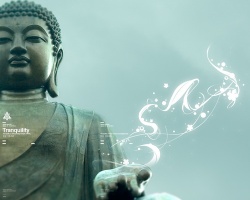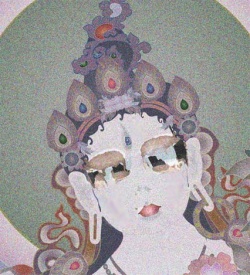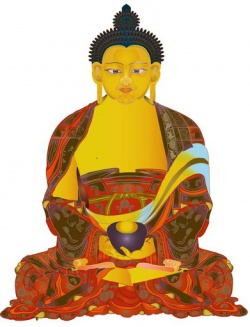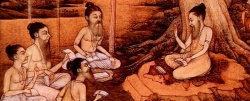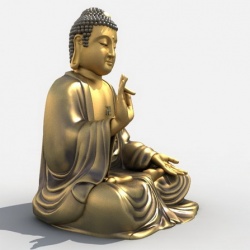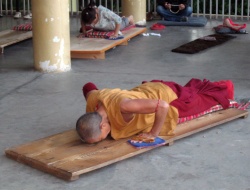Difference between revisions of "Acela Sutta"
m (1 revision: Samyutta Nikaya) |
|||
| (7 intermediate revisions by 2 users not shown) | |||
| Line 1: | Line 1: | ||
| − | To the Clothless Ascetic | + | {{DisplayImages|324|1001|1600|1448|1820|1176}} |
| + | {{Centre|{{Big2x|To the Clothless [[Ascetic]]}}<br/> | ||
| + | translated from the [[Pali]] by<br/> | ||
| + | [[Thanissaro Bhikkhu]]}}<br/><br/> | ||
| − | + | I have heard that on one [[occasion]] the [[Blessed One]] was staying near [[Rajagaha]] in the [[Bamboo Grove]], the Squirrels' [[Sanctuary]]. Then early in the morning the [[Blessed One]], having put on his [[robes]] and carrying his [[bowl]] and [[outer robe]], went into [[Rajagaha]] for [[alms]]. Kassapa-the-clothless[1] [[ascetic]] saw him coming from afar. On [[seeing]] him, he went to him and, on arrival, exchanged courteous [[greetings]] with him. After an exchange of friendly [[greetings]] & courtesies, he stood to one side. As he was [[standing]] there, he said to the [[Blessed One]], "We would like to question [[Master]] [[Gotama]] about a certain point, if he would take the [[time]] to answer our question." | |
| − | + | "This is not the [[time]] for a question, [[Kassapa]]. We have entered among houses." | |
| − | + | A second [[time]]... A third [[time]] [[Kassapa]] the clothless [[ascetic]] said to him, "We would like to question [[Master]] [[Gotama]] about a certain point, if he would take the [[time]] to answer our question." | |
| − | "This is not the time for a question, Kassapa. We have entered among houses." | + | "This is not the [[time]] for a question, [[Kassapa]]. We have entered among houses." |
| − | + | When this was said, [[Kassapa]] the clothless [[ascetic]] said, "What we want to ask isn't much." | |
| − | |||
| − | |||
| − | |||
| − | When this was said, Kassapa the clothless ascetic said, "What we want to ask isn't much." | ||
"Then ask as you like." | "Then ask as you like." | ||
| − | "Master Gotama, is stress self-made?" | + | "[[Master]] [[Gotama]], is [[stress]] self-made?" |
| − | "Don't say that, Kassapa." | + | "Don't say that, [[Kassapa]]." |
"Then is it other-made?" | "Then is it other-made?" | ||
| − | "Don't say that, Kassapa." | + | "Don't say that, [[Kassapa]]." |
"Then is it both self-made and other-made?" | "Then is it both self-made and other-made?" | ||
| − | "Don't say that, Kassapa." | + | "Don't say that, [[Kassapa]]." |
| − | "Then is it the case that stress, being neither self-made nor other-made, arises spontaneously?" | + | "Then is it the case that [[stress]], being neither self-made nor other-made, arises spontaneously?" |
| − | "Don't say that, Kassapa." | + | "Don't say that, [[Kassapa]]." |
| − | "Then does stress not exist?" | + | "Then does [[stress]] not [[exist]]?" |
| − | "It's not the case, Kassapa, that stress does not exist. Stress does exist." | + | "It's not the case, [[Kassapa]], that [[stress]] does not [[exist]]. [[Stress]] does [[exist]]." |
| − | "Well, in that case, does Master Gotama not know or see stress?" | + | "Well, in that case, does [[Master]] [[Gotama]] not know or see [[stress]]?" |
| − | "Kassapa, it's not the case that I don't know or see stress. I know stress. I see stress." | + | "[[Kassapa]], it's not the case that I don't know or see [[stress]]. I know [[stress]]. I see [[stress]]." |
| − | "Now, when asked, 'Is stress self-made?' you say, 'Don't say that, Kassapa.' When asked, 'Then is it other-made?' you say, 'Don't say that, Kassapa.' When asked, 'Then is it both self-made and other-made?' you say, 'Don't say that, Kassapa.' When asked, 'Then is it the case that stress, being neither self-made nor other-made, arises spontaneously?' you say, 'Don't say that, Kassapa.' When asked, 'Then does stress not exist?' you say, 'It's not the case, Kassapa, that stress does not exist. Stress does exist.' When asked, 'Well, in that case, does Master Gotama not know or see stress?' you say, 'Kassapa, it's not the case that I don't know or see stress. I know stress. I see stress.' Then explain stress to me, lord Blessed One. Teach me about stress, lord Blessed One!" | + | "Now, when asked, 'Is [[stress]] self-made?' you say, 'Don't say that, [[Kassapa]].' When asked, 'Then is it other-made?' you say, 'Don't say that, [[Kassapa]].' When asked, 'Then is it both self-made and other-made?' you say, 'Don't say that, [[Kassapa]].' When asked, 'Then is it the case that [[stress]], being neither self-made nor other-made, arises spontaneously?' you say, 'Don't say that, [[Kassapa]].' When asked, 'Then does [[stress]] not [[exist]]?' you say, 'It's not the case, [[Kassapa]], that [[stress]] does not [[exist]]. [[Stress]] does [[exist]].' When asked, 'Well, in that case, does [[Master]] [[Gotama]] not know or see [[stress]]?' you say, '[[Kassapa]], it's not the case that I don't know or see [[stress]]. I know [[stress]]. I see [[stress]].' Then explain [[stress]] to me, [[lord]] [[Blessed One]]. Teach me about [[stress]], [[lord]] [[Blessed One]]!" |
| − | "'The one who acts is the one who experiences [the result of the act]' amounts to the eternalist statement, 'Existing from the very beginning, stress is self-made.' 'The one who acts is someone other than the one who experiences'[2] amounts to the annihilationist statement, 'For one existing harassed by feeling, stress is other-made.' Avoiding these two extremes, the Tathagata teaches the Dhamma via the middle: | + | "'The one who acts is the one who [[experiences]] [the result of the act]' amounts to the {{Wiki|eternalist}} statement, '[[Existing]] from the very beginning, [[stress]] is self-made.' 'The one who acts is someone other than the one who [[experiences]]'[2] amounts to the {{Wiki|annihilationist}} statement, 'For one [[existing]] harassed by [[feeling]], [[stress]] is other-made.' Avoiding these [[two extremes]], the [[Tathagata]] teaches the [[Dhamma]] via the middle: |
| − | From ignorance as a requisite condition come fabrications. | + | From [[ignorance]] as a requisite [[condition]] come [[fabrications]]. |
| − | From fabrications as a requisite condition comes consciousness. | + | From [[fabrications]] as a requisite [[condition]] comes [[consciousness]]. |
| − | From consciousness as a requisite condition comes name-&-form. | + | From [[consciousness]] as a requisite [[condition]] comes name-&-form. |
| − | From name-&-form as a requisite condition come the six sense media. | + | From name-&-form as a requisite [[condition]] come the [[six sense]] media. |
| − | From the six sense media as a requisite condition comes contact. | + | From the [[six sense]] media as a requisite [[condition]] comes [[contact]]. |
| − | From contact as a requisite condition comes feeling. | + | From [[contact]] as a requisite [[condition]] comes [[feeling]]. |
| − | From feeling as a requisite condition comes craving. | + | From [[feeling]] as a requisite [[condition]] comes [[craving]]. |
| − | From craving as a requisite condition comes clinging/sustenance. | + | From [[craving]] as a requisite [[condition]] comes clinging/sustenance. |
| − | From clinging/sustenance as a requisite condition comes becoming. | + | From clinging/sustenance as a requisite [[condition]] comes becoming. |
| − | From becoming as a requisite condition comes birth. | + | From becoming as a requisite [[condition]] comes [[birth]]. |
| − | From birth as a requisite condition, then aging & death, sorrow, lamentation, pain, distress, & despair come into play. Such is the origination of this entire mass of stress & suffering. | + | From [[birth]] as a requisite [[condition]], then [[aging]] & [[death]], [[sorrow]], [[lamentation]], [[pain]], {{Wiki|distress}}, & {{Wiki|despair}} come into play. Such is the origination of this entire {{Wiki|mass}} of [[stress]] & [[suffering]]. |
| − | "Now from the remainderless fading & cessation of that very ignorance comes the cessation of fabrications. From the cessation of fabrications comes the cessation of consciousness. From the cessation of consciousness comes the cessation of name-&-form. From the cessation of name-&-form comes the cessation of the six sense media. From the cessation of the six sense media comes the cessation of contact. From the cessation of contact comes the cessation of feeling. From the cessation of feeling comes the cessation of craving. From the cessation of craving comes the cessation of clinging/ sustenance. From the cessation of clinging/sustenance comes the cessation of becoming. From the cessation of becoming comes the cessation of birth. From the cessation of birth, then aging & death, sorrow, lamentation, pain, distress, & despair all cease. Such is the cessation of this entire mass of stress & suffering." | + | "Now from the remainderless fading & [[cessation]] of that very [[ignorance]] comes the [[cessation]] of [[fabrications]]. From the [[cessation]] of [[fabrications]] comes the [[cessation]] of [[consciousness]]. From the [[cessation]] of [[consciousness]] comes the [[cessation]] of name-&-form. From the [[cessation]] of name-&-form comes the [[cessation]] of the [[six sense]] media. From the [[cessation]] of the [[six sense]] media comes the [[cessation]] of [[contact]]. From the [[cessation]] of [[contact]] comes the [[cessation]] of [[feeling]]. From the [[cessation]] of [[feeling]] comes the [[cessation]] of [[craving]]. From the [[cessation]] of [[craving]] comes the [[cessation]] of [[clinging]]/ [[sustenance]]. From the [[cessation]] of clinging/sustenance comes the [[cessation]] of becoming. From the [[cessation]] of becoming comes the [[cessation]] of [[birth]]. From the [[cessation]] of [[birth]], then [[aging]] & [[death]], [[sorrow]], [[lamentation]], [[pain]], {{Wiki|distress}}, & {{Wiki|despair}} all cease. Such is the [[cessation]] of this entire {{Wiki|mass}} of [[stress]] & [[suffering]]." |
| − | When this was said, Kassapa the clothless ascetic said, "Magnificent, lord! Magnificent! Just as if he were to place upright what was overturned, to reveal what was hidden, to show the way to one who was lost, or to carry a lamp into the dark so that those with eyes could see forms, in the same way has the Blessed One — through many lines of reasoning — made the Dhamma clear. I go to the Blessed One for refuge, to the Dhamma, and to the community of monks. Let me obtain the going forth in the Blessed One's presence, let me obtain admission." | + | When this was said, [[Kassapa]] the clothless [[ascetic]] said, "Magnificent, [[lord]]! Magnificent! Just as if he were to place upright what was overturned, to reveal what was hidden, to show the way to one who was lost, or to carry a [[lamp]] into the dark so that those with [[eyes]] could see [[forms]], in the same way has the [[Blessed One]] — through many lines of {{Wiki|reasoning}} — made the [[Dhamma]] clear. I go to the [[Blessed One]] for [[refuge]], to the [[Dhamma]], and to the [[community of monks]]. Let me obtain the going forth in the [[Blessed One's]] presence, let me obtain admission." |
| − | "Anyone, Kassapa, who has previously belonged to another sect and who desires the going forth & admission in this doctrine & discipline, must first undergo probation for four months. If, at the end of four months, the monks feel so moved, they give him the going forth & admit him to the monk's state. But I know distinctions among individuals in this matter." | + | "Anyone, [[Kassapa]], who has previously belonged to another [[sect]] and who [[desires]] the going forth & admission in this [[doctrine]] & [[discipline]], must first undergo probation for four months. If, at the end of four months, the [[monks]] [[feel]] so moved, they give him the going forth & admit him to the [[monk's]] [[state]]. But I know {{Wiki|distinctions}} among {{Wiki|individuals}} in this {{Wiki|matter}}." |
| − | "Lord, if that is so, I am willing to undergo probation for four years. If, at the end of four years, the monks feel so moved, let them give me the going forth & admit me to the monk's state." | + | "[[Lord]], if that is so, I am willing to undergo probation for four years. If, at the end of four years, the [[monks]] [[feel]] so moved, let them give me the going forth & admit me to the [[monk's]] [[state]]." |
| − | Then Kassapa the clothless ascetic obtained the going forth in the Blessed One's presence, he obtained admission. And not long after his admission — dwelling alone, secluded, heedful, ardent, & resolute — he in no long time reached & remained in the supreme goal of the holy life, for which clansmen rightly go forth from home into homelessness, knowing & realizing it for himself in the here & now. He knew: "Birth is ended, the holy life fulfilled, the task done. There is nothing further for the sake of this world." And thus Ven. Kassapa became another one of the arahants." | + | Then [[Kassapa]] the clothless [[ascetic]] obtained the going forth in the [[Blessed One's]] presence, he obtained admission. And not long after his admission — dwelling alone, secluded, heedful, ardent, & resolute — he in no long [[time]] reached & remained in the supreme goal of the {{Wiki|holy}} [[life]], for which clansmen rightly go forth from [[home]] into homelessness, [[knowing]] & [[realizing]] it for himself in the here & now. He knew: "[[Birth]] is ended, the {{Wiki|holy}} [[life]] fulfilled, the task done. There is [[nothing]] further for the sake of this [[world]]." And thus Ven. [[Kassapa]] became another one of the [[arahants]]." |
==Notes== | ==Notes== | ||
| − | 1. Acela: "One without cloth." Often translated as "naked," but as MN 45 shows, such a person might wear garments made of something other than cloth. | + | 1. [[Acela]]: "One without cloth." Often translated as "naked," but as MN 45 shows, such a [[person]] might wear garments made of something other than cloth. |
| − | 2. This statement is annihilationist in implying that personal identity is simply a series of radically different persons, one disappearing to be replaced by another repeatedly throughout time. In other words, the X who did the action whose fruit X is now experiencing is a radically different X from the X who is now experiencing it. That first X has disappeared and has been replaced by a different one. The Buddha avoids this error, and the eternalist error of self-causation — by refusing to get entangled in questions of personal identity. See MN 109, SN 12.12, and SN 12.35. | + | 2. This statement is {{Wiki|annihilationist}} in implying that personal [[Wikipedia:Identity (social science)|identity]] is simply a series of radically different persons, one disappearing to be replaced by another repeatedly throughout [[time]]. In other words, the X who did the [[action]] whose fruit X is now experiencing is a radically different X from the X who is now experiencing it. That first X has disappeared and has been replaced by a different one. The [[Buddha]] avoids this error, and the {{Wiki|eternalist}} error of self-causation — by refusing to get entangled in questions of personal [[Wikipedia:Identity (social science)|identity]]. See MN 109, SN 12.12, and SN 12.35. |
| − | [[Category: | + | {{R}} |
| + | [http://www.dhammawiki.com/index.php?title=Category:Samyutta_Nikaya dhammawiki.com] | ||
| + | [[Category:Saṃyutta Nikāya]] | ||
Latest revision as of 07:02, 9 March 2015
To the Clothless Ascetic
translated from the Pali by
Thanissaro Bhikkhu
I have heard that on one occasion the Blessed One was staying near Rajagaha in the Bamboo Grove, the Squirrels' Sanctuary. Then early in the morning the Blessed One, having put on his robes and carrying his bowl and outer robe, went into Rajagaha for alms. Kassapa-the-clothless[1] ascetic saw him coming from afar. On seeing him, he went to him and, on arrival, exchanged courteous greetings with him. After an exchange of friendly greetings & courtesies, he stood to one side. As he was standing there, he said to the Blessed One, "We would like to question Master Gotama about a certain point, if he would take the time to answer our question."
"This is not the time for a question, Kassapa. We have entered among houses."
A second time... A third time Kassapa the clothless ascetic said to him, "We would like to question Master Gotama about a certain point, if he would take the time to answer our question."
"This is not the time for a question, Kassapa. We have entered among houses."
When this was said, Kassapa the clothless ascetic said, "What we want to ask isn't much."
"Then ask as you like."
"Master Gotama, is stress self-made?"
"Don't say that, Kassapa."
"Then is it other-made?"
"Don't say that, Kassapa."
"Then is it both self-made and other-made?"
"Don't say that, Kassapa."
"Then is it the case that stress, being neither self-made nor other-made, arises spontaneously?"
"Don't say that, Kassapa."
"It's not the case, Kassapa, that stress does not exist. Stress does exist."
"Well, in that case, does Master Gotama not know or see stress?"
"Kassapa, it's not the case that I don't know or see stress. I know stress. I see stress."
"Now, when asked, 'Is stress self-made?' you say, 'Don't say that, Kassapa.' When asked, 'Then is it other-made?' you say, 'Don't say that, Kassapa.' When asked, 'Then is it both self-made and other-made?' you say, 'Don't say that, Kassapa.' When asked, 'Then is it the case that stress, being neither self-made nor other-made, arises spontaneously?' you say, 'Don't say that, Kassapa.' When asked, 'Then does stress not exist?' you say, 'It's not the case, Kassapa, that stress does not exist. Stress does exist.' When asked, 'Well, in that case, does Master Gotama not know or see stress?' you say, 'Kassapa, it's not the case that I don't know or see stress. I know stress. I see stress.' Then explain stress to me, lord Blessed One. Teach me about stress, lord Blessed One!"
"'The one who acts is the one who experiences [the result of the act]' amounts to the eternalist statement, 'Existing from the very beginning, stress is self-made.' 'The one who acts is someone other than the one who experiences'[2] amounts to the annihilationist statement, 'For one existing harassed by feeling, stress is other-made.' Avoiding these two extremes, the Tathagata teaches the Dhamma via the middle:
From ignorance as a requisite condition come fabrications.
From fabrications as a requisite condition comes consciousness.
From consciousness as a requisite condition comes name-&-form.
From name-&-form as a requisite condition come the six sense media.
From the six sense media as a requisite condition comes contact.
From contact as a requisite condition comes feeling.
From feeling as a requisite condition comes craving.
From craving as a requisite condition comes clinging/sustenance.
From clinging/sustenance as a requisite condition comes becoming.
From becoming as a requisite condition comes birth.
From birth as a requisite condition, then aging & death, sorrow, lamentation, pain, distress, & despair come into play. Such is the origination of this entire mass of stress & suffering.
"Now from the remainderless fading & cessation of that very ignorance comes the cessation of fabrications. From the cessation of fabrications comes the cessation of consciousness. From the cessation of consciousness comes the cessation of name-&-form. From the cessation of name-&-form comes the cessation of the six sense media. From the cessation of the six sense media comes the cessation of contact. From the cessation of contact comes the cessation of feeling. From the cessation of feeling comes the cessation of craving. From the cessation of craving comes the cessation of clinging/ sustenance. From the cessation of clinging/sustenance comes the cessation of becoming. From the cessation of becoming comes the cessation of birth. From the cessation of birth, then aging & death, sorrow, lamentation, pain, distress, & despair all cease. Such is the cessation of this entire mass of stress & suffering."
When this was said, Kassapa the clothless ascetic said, "Magnificent, lord! Magnificent! Just as if he were to place upright what was overturned, to reveal what was hidden, to show the way to one who was lost, or to carry a lamp into the dark so that those with eyes could see forms, in the same way has the Blessed One — through many lines of reasoning — made the Dhamma clear. I go to the Blessed One for refuge, to the Dhamma, and to the community of monks. Let me obtain the going forth in the Blessed One's presence, let me obtain admission."
"Anyone, Kassapa, who has previously belonged to another sect and who desires the going forth & admission in this doctrine & discipline, must first undergo probation for four months. If, at the end of four months, the monks feel so moved, they give him the going forth & admit him to the monk's state. But I know distinctions among individuals in this matter."
"Lord, if that is so, I am willing to undergo probation for four years. If, at the end of four years, the monks feel so moved, let them give me the going forth & admit me to the monk's state."
Then Kassapa the clothless ascetic obtained the going forth in the Blessed One's presence, he obtained admission. And not long after his admission — dwelling alone, secluded, heedful, ardent, & resolute — he in no long time reached & remained in the supreme goal of the holy life, for which clansmen rightly go forth from home into homelessness, knowing & realizing it for himself in the here & now. He knew: "Birth is ended, the holy life fulfilled, the task done. There is nothing further for the sake of this world." And thus Ven. Kassapa became another one of the arahants."
Notes
1. Acela: "One without cloth." Often translated as "naked," but as MN 45 shows, such a person might wear garments made of something other than cloth.
2. This statement is annihilationist in implying that personal identity is simply a series of radically different persons, one disappearing to be replaced by another repeatedly throughout time. In other words, the X who did the action whose fruit X is now experiencing is a radically different X from the X who is now experiencing it. That first X has disappeared and has been replaced by a different one. The Buddha avoids this error, and the eternalist error of self-causation — by refusing to get entangled in questions of personal identity. See MN 109, SN 12.12, and SN 12.35.
